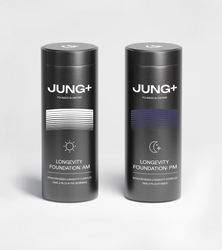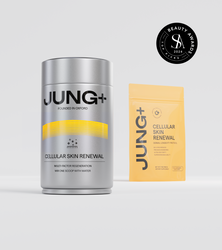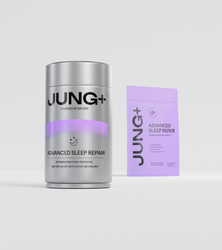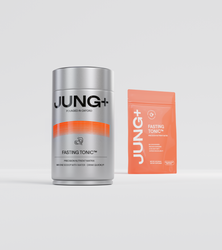One of the greatest achievements of the modern world is the affordability and abundance of food. But fast calories, junk food, and trans fats have at the same time contributed to the rise in obesity, diabetes, hypertension, atherosclerosis, and other chronic diseases.
Many of these conditions can be prevented through proper nutrition. One of the most well-known and widely studied diets is the Mediterranean diet, which we discussed here.
The key to the benefits of a well-balanced meal plan lies in the longevity-promoting superfoods and the powerful bioactive compounds they contain. In this guide, we will explore the science behind these foods, their biological benefits, and practical strategies for incorporating them into your daily diet. Additionally, we'll examine how supplements can help bridge the gap between diet and optimal nutrient intake, ensuring you maximize the effectiveness of your nutritional choices.
Foods That Undermine Longevity
For the first time in centuries, food has become more accessible than ever. However, the rise of processed foods, rapid urbanization, and changing lifestyles have led to a dramatic shift in eating habits.
Many people now consume excessive amounts of calorie-dense foods high in fat, refined sugars, and salt, while falling short on essential nutrients from fruits, vegetables, and fiber. Additionally, modern life presents challenges to maintaining a balanced diet, whether due to convenience, busy schedules, social events, or personal cravings.
While such a diet may provide immediate satisfaction, it accelerates aging in the long run:
-
Processed Foods & Refined Sugars: These contribute to insulin resistance, chronic inflammation, and oxidative stress, all of which promote premature aging.
-
Trans Fats & Processed Oils: Found in many fried and packaged foods, these fats trigger systemic inflammation, damage cell membranes, and increase the risk of cardiovascular disease.
-
Excessive Alcohol & Sugary Cocktails: Alcohol depletes essential nutrients, impairs liver function, and promotes dehydration, all of which negatively impact longevity.
-
Highly Processed Meats: Deli meats, bacon, and sausages contain preservatives like nitrates and advanced glycation end-products (AGEs), which fuel inflammation and oxidative stress.
It's important not only to avoid unhealthy foods, but also to include healthy foods in your diet that promote longevity.
The Science Behind Longevity Foods
Longevity foods—often referred to as ultimate superfoods—are renowned for their ability to support a healthier, longer life. These nutrient-dense foods contain essential compounds and various antioxidants that combat aging at the cellular level, aiding processes such as DNA repair and inflammation reduction. While no single product can positively impact all 12 hallmarks of aging, strategically incorporating a variety of superfoods into your diet is key to promoting longevity.
Let’s explore the molecular mechanisms behind these powerful foods and their connection to longevity:
DNA Repair
Our DNA is constantly exposed to oxidative stress, environmental factors, and the natural wear and tear of cellular processes. As we age, DNA repair mechanisms weaken, leading to mutations, error accumulation, and cell death, accelerating aging and increasing the risk of age-related diseases.
Inflammation
Chronic inflammation accelerates cellular aging, damages tissues, and impairs the body's ability to regenerate. It also plays a significant role in the development of various age-related diseases.
Cellular Energy
Mitochondria, the powerhouse of our cells, generate energy in the form of ATP. However, with age, mitochondrial function declines, resulting in reduced energy production and increased accumulation of harmful byproducts such as free radicals.
Telomere Support
Telomeres, the protective caps at the ends of chromosomes, prevent chromosomes from sticking together and play a key role in cell division and DNA replication. With each cell division, telomeres shorten until the cell can no longer divide. This process is closely linked to aging, cellular senescence, and the onset of age-related diseases.
Gut Health
Recent research has highlighted the strong connection between the gut microbiome, inflammation regulation, metabolic health, and longevity. Imbalances in gut microbiota have been linked to accelerated aging and an increased risk of age-related diseases.
Integrating Longevity Foods into Your Diet
Incorporating longevity foods into your daily meals is easier than you might think. Here are a few tips:
-
Start Small: Add blueberries to your breakfast, a handful of nuts as a snack, or olive oil to your salad dressing.
-
Focus on Variety: Fill your plate with a diverse range of fruits, vegetables, and proteins, each offering unique longevity benefits.
-
Combine with Supplements: While natural foods provide essential nutrients, supplements ensure you receive concentrated doses. Using both strategies maximizes nutrient intake and enhances overall health.
-
Plan Ahead: Meal prepping with longevity foods makes healthy eating more convenient. Prepare a quinoa bowl, pre-cut vegetables, or portion out nuts and seeds for easy snacking.
-
Spice Up Your Meals: Incorporate anti-inflammatory spices like turmeric, ginger, and cinnamon to support overall health and longevity.
-
Experiment with New Recipes: Try longevity-focused dishes such as Mediterranean cuisine, miso soup, or superfood smoothies.
-
Choose Healthy Cooking Methods: To preserve nutrients, opt for steaming, baking, or sautéing instead of deep-frying.
-
Eat Mindfully: Slow down, chew thoroughly, and savor your meals to improve digestion and nutrient absorption.
Don’t forget the importance of timing when it comes to both your nutrition and supplement regimen. We’ve previously discussed the significance of timing here and here, and below are a few examples of how to optimize it:
-
Breakfast should include longevity foods that provide sustained energy and essential nutrients.
-
Lunch should feature vegetables, lean proteins, and healthy fats to support energy levels, digestive health, and overall longevity.
-
Dinner should focus on foods that enhance cellular repair, boost metabolism, and promote relaxation and restful sleep.
If you are fasting, incorporate longevity foods into your eating window, and during fasting periods, choose healthy supplements and foods that help curb hunger and support autophagy. You can read more about them here.
10 Anti-aging & Longevity Superfoods
-
Berries are rich in antioxidants, particularly anthocyanins, which help neutralize free radicals. This reduces oxidative stress and protects DNA from damage (1).
-
Salmon is rich in omega-3 fatty acids, particularly EPA and DHA. Omega-3s inhibit the production of inflammatory cytokines and reduce the activity of pro-inflammatory enzymes, promoting a balanced immune response (2).
-
Leafy greens (like spinach and kale) are packed with magnesium, a vital mineral for mitochondrial function. Magnesium helps regulate ATP production and plays a role in the proper functioning of mitochondria. Additionally, the high levels of antioxidants in leafy greens help reduce mitochondrial oxidative stress, supporting energy production (3).
-
Nuts are rich in vitamin E, an antioxidant that plays a key role in preventing oxidative damage to cell membranes, including DNA. Vitamin E can also enhance the function of DNA repair enzymes, helping to reduce the impact of cellular damage over time (4).
-
Avocados are rich in healthy fats, vitamins, minerals, and fiber, which help maintain heart health, support cellular function, and reduce inflammation (5).
-
Turmeric or curcumin has powerful anti-inflammatory properties. It inhibits the activity of inflammatory enzymes and cytokines, reducing inflammation throughout the body. Curcumin also activates the Nrf2 pathway, which helps the body defend against oxidative stress and inflammation (6).
-
Extra virgin olive oil is rich in polyphenols, which can reduce markers of inflammation, including C-reactive protein, and has been linked to a reduced risk of chronic diseases associated with aging, such as heart disease and diabetes (7).
-
Green tea contains high levels of polyphenols, which help increase mitochondrial biogenesis (the creation of new mitochondria) and support the removal of damaged mitochondria, promoting cellular rejuvenation (8).
-
Dark chocolate contains numerous compounds that have been shown to benefit longevity and promote overall health. The key factors in dark chocolate’s positive impact on aging are its rich antioxidant content, heart-healthy fats, and the ability to support cognitive health (9).
-
Fermented foods are rich in probiotics and prebiotics, which promote a healthy gut microbiome. Probiotics can help regulate the immune system, reduce inflammation, and improve digestion, all of which contribute to healthy aging (10).
10 Key Longevity Nutrients & Their Food Sources
Despite the variety and benefits of foods, the main limiting factor is the amount you need to eat to reach therapeutic levels of nutrients. This is where longevity supplements come to the rescue:
Niacin
Source: meats (chicken, and turkey), fish (salmon, tuna), avocados, and soy products
Benefit: Niacin is vital for boosting NAD+ production, a coenzyme crucial for energy metabolism and DNA repair. Increased NAD+ levels help cells recover from damage and maintain their functional integrity, slowing the aging process.
Dietary Dose Equivalent: approximately 3 kg of salmon are needed to achieve a single 200 mg therapeutic dose.
Pterostilbene (Bioavailable version of Resveratrol)
Source: Blueberries
Benefit: This potent antioxidant improves cognitive function, supports healthy cholesterol levels, and reduces oxidative stress. By mimicking caloric restriction effects, pterostilbene promotes longevity by activating sirtuins, proteins involved in cellular health.
Dietary Dose Equivalent: approximately 3 kg of blueberries are needed to achieve a single 100 mg therapeutic dose.
Astaxanthin
Source: Wild-caught salmon, krill
Benefit: Known as one of the most powerful antioxidants, astaxanthin improves skin elasticity, protects against UV damage, and reduces inflammation. Its anti-aging properties also enhance mitochondrial function, ensuring cells produce energy efficiently.
Dietary Dose Equivalent: approximately 1 kg of krill is needed to achieve a single 4 mg therapeutic dose.
Fisetin
Source: Strawberries, apples
Benefit: Fisetin acts as a senolytic, clearing out damaged or "zombie" cells that contribute to aging and chronic disease. This molecule enhances cellular health, supports brain function, and reduces inflammation associated with aging.
Dietary Dose Equivalent: Around 37 strawberries are needed to provide a therapeutic dose of fisetin.
Apigenin
Source: Parsley, chamomile
Benefit: Apigenin promotes cellular homeostasis by reducing inflammation and oxidative stress. It also modulates enzymes linked to aging, such as CD38, which can deplete NAD+ levels, making it a crucial compound for longevity.
Dietary Dose Equivalent: Therapeutic levels are difficult to achieve without supplementation.
Creatine
Source: Lean red meat and fish
Benefit: Creatine supports cellular energy production, enhances brain function, and aids in muscle maintenance. It helps improve physical performance, cognitive health, and overall vitality.
Dietary Dose Equivalent: Therapeutic levels are difficult to achieve without supplementation.
Quercetin
Source: Capers, onions, apples
Benefit: As a powerful antioxidant, quercetin reduces oxidative stress and inflammation, supporting cardiovascular health and cellular integrity. It also works synergistically with other compounds, such as fisetin, to amplify senolytic activity.
Dietary Dose Equivalent: Approximately 500 g of capers are needed for a single dose.
Spermidine
Source: Aged cheese, mushrooms, whole grains, sprouts
Benefit: Spermidine stimulates autophagy, the body’s natural process of removing damaged cells and regenerating healthy ones. This cellular cleanup mechanism is essential for maintaining youthful function and reducing disease risk.
Dietary Dose Equivalent: Several pounds of mushrooms would be required for a single dose.
Glycine
Source: Gelatin, poultry skin
Benefit: Glycine supports collagen production, essential for skin elasticity and joint health. It also promotes better sleep quality by modulating neurotransmitters, an often-overlooked factor in longevity.
Dietary Note: Supplements provide targeted doses for consistent results.
Oleuropein (Olive Oil)
Source: Olives, olive oil
Benefit: This polyphenol supports heart health, reduces inflammation, and enhances autophagy. By improving cellular efficiency and protecting against oxidative stress, oleuropein plays a significant role in promoting longevity.
Dietary Dose Equivalent: Regular consumption of high-quality olive oil is recommended, but supplementation provides more consistent levels.
Collagen peptides
Source: Bone broth, chicken skin
Benefit: Collagen is a structural protein that improves skin elasticity, joint mobility, and overall connective tissue health. It is vital for counteracting the natural decline in collagen production as we age.
Dietary Dose Equivalent: While collagen-rich foods are beneficial, collagen peptides in supplements ensure effective absorption and utilization.
The Challenge of Dietary Sources Versus Supplements
Although a balanced, nutrient-rich diet is essential for long-term health, some longevity-promoting compounds are present in foods in such small amounts that achieving therapeutic doses through diet alone is nearly impossible without excessive consumption:
-
Quantity required: To reach therapeutic levels of spermidine, one would need to consume several pounds of mushrooms daily. Similarly, obtaining the health benefits of fisetin would require eating over 30 strawberries per day—an unrealistic amount for most diets.
-
Bioavailability challenges: Certain compounds, such as pterostilbene and curcumin, have low bioavailability when consumed through food alone, limiting their effectiveness.
-
Time and cost constraints: Preparing and consuming large quantities of specific foods can be both time-consuming and expensive compared to the convenience of supplementation.
Supplements help bridge this gap by providing concentrated doses of essential nutrients efficiently and cost-effectively, ensuring the body receives optimal amounts without the burden of excessive daily food intake.
The Benefits of Supplements for Longevity
Supplements provide a targeted and effective way to enhance your longevity efforts, delivering essential nutrients in optimal doses that are often impractical to achieve through diet alone. Here are the key benefits of incorporating supplements into your regimen:
-
Precision and consistency
-
Enhanced bioavailability
-
Comfort and simplicity of use
-
Synergistic formulations
-
Year-round access
-
Customizable solutions
-
Comfortable cost
Discover the science-backed formulations of Jung+ supplements and elevate your approach to longevity. Explore our products today and take the first step toward a healthier, longer life. Consult with a healthcare provider to create a personalized supplement plan that complements your dietary habits and health goals.
References:
-
Anthocyanins and Human Health—A Focus on Oxidative Stress, Inflammation and Disease (2020). Antioxidants (Basel).
-
Modulation of inflammatory cytokines by omega-3 fatty acids (2008). Subcellular Biochemistry.
-
The Involvement of Mg2+ in Regulation of Cellular and Mitochondrial Functions (2017). Oxidative Medicine and Cellular Longevity.
-
Nutrition Can Help DNA Repair in the Case of Aging (2020). Nutrients.
-
Hass Avocado Composition and Potential Health Effects (2013). Critical Reviews in Food Science and Nutrition.
-
The Immunomodulatory and Anti-Inflammatory Effect of Curcumin on Immune Cell Populations, Cytokines, and In Vivo Models of Rheumatoid Arthritis (2021). Pharmaceuticals.
-
Olive Oil Polyphenols Improve HDL Cholesterol and Promote Maintenance of Lipid Metabolism: A Systematic Review and Meta-Analysis of Randomized Controlled Trials (2023). Metabolites.
-
Green tea polyphenols stimulate mitochondrial biogenesis and improve renal function after chronic cyclosporin A treatment in rats (2013). PLoS One.
-
Dark chocolate: An overview of its biological activity, processing, and fortification approaches (2022). Current Research in Food Science.
-
Fermented Foods, Health and the Gut Microbiome (2022). Nutrients.




